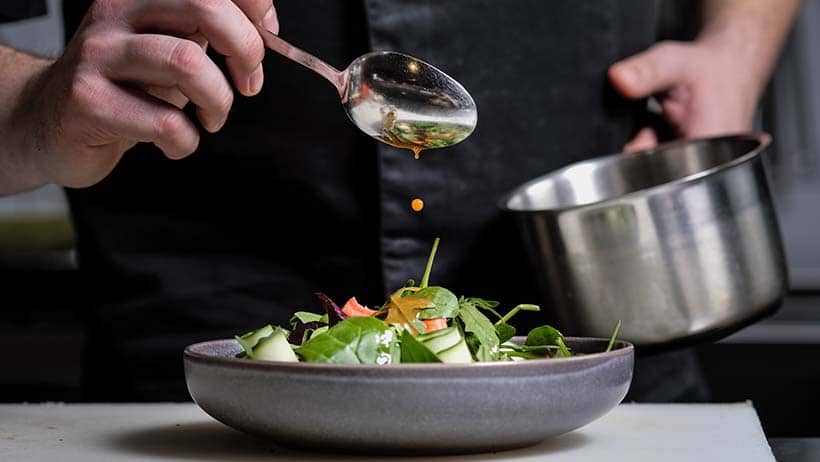
Eating in accordance with our unique constitution is one of the fundamental ways of promoting overall health and vitality. Not only does our choice of ingredients affect our digestive capacity, but also the way in which they are prepared and consumed.
Qualities to Favour
Ayurveda teaches that everything that comes into being is composed of a unique ratio of the five elements (pancha mahabhutas). In pairs, these five elements form the doshas: vata, pitta and kapha. Once we start to think about our constitution in terms of one, or sometimes two, predominating doshas, it is easy to forget the elements that they represent.
Kapha dosha consists of the elements earth and water. Therefore it is heavy, dense, moist, cold, and slow in quality. In order to find balance, those with a kapha constitution should look to counter these qualities with their opposites — namely, things that are warm, stimulating, dry, and light in nature.
Kapha greatly benefits from a diet of freshly cooked whole foods and vegetables that are warming and well-spiced to make them easier to digest. Kapha is balanced by simple and small meals that are served warm or hot. Try to emphasise foods that are pungent, bitter or astringent in flavour, and minimize the consumption of sweet, salty or sour foods. For more information on specific foods to favour see my article, 5 dietary tips for Kapha dosha.
As kapha-types tend to have a slower metabolism, they are well-suited to occasional fasting. Although kapha-types may experience cravings, they don’t experience intense hunger as regularly as the other dosha types, and they can maintain a good level of strength and energy on a smaller quantity of food.
Breakfast
When kapha is elevated in the system, breakfast can be optional. The overnight fast is very beneficial to kapha, however if the appetite hasn’t returned in the morning, there is no use eating just for the sake of it. Start with some herbal tea (perhaps ginger tea to stimulate agni) and a plate of fresh or stewed fruits. This may be sufficient for you. However if you do feel the need for something a little more substantive, you could opt for a simple hot cereal or muesli sweetened with honey.
It is advised to keep breakfast simple, light and easy to digest so that kapha does not become aggravated and bogged down first thing in the morning.
Lunch
During the middle of the day the digestive fire (agni) is as its strongest. Therefore, Ayurveda teaches that lunch should be the largest and most nourishing meal of the day. Kapha thrives on a wide range of cooked (steamed or sauteed) vegetables with appropriate grains and legumes, freshly prepared with plenty of digestive spices.
Some examples of suitable lunchtime meals for kapha dosha include:
- A hearty, chunky vegetable soup with an assortment of seasonal vegetables, wilted greens and beans. Served with a piece of crusty whole-grain bread or rye toast
- Daal with wilted spinach, cilantro and fresh lime
- Saffron and turmeric kitchari with steamed or sauteed seasonal vegetables and plenty of greens
Dinner
The evening meal should be significantly lighter and smaller than lunch. However, it is still best to favour a warm and nourishing meal. Soups and stews cooked with plenty of digestive spices and served in smaller portions are ideal for soothing kapha without over-taxing the digestive system. It is important to allow plenty of time (around 3 hours) between the end of the meal and bedtime to avoid indigestion, a feeling of heaviness, or the production of ama (toxins).
Some examples of a kapha balancing evening meal include:
- Chickpea and dried apricot tagine with quinoa, garnished with mint and cilantro
- Spiced sweet potato and ginger soup
- Persian baked rice with cumin, turmeric and green olives with a small side salad of shaved fennel and arugula with a zingy lemon dressing
Snacks
Those with a kapha-dominant constitution would do best to avoid snacking and to aim for a fast of between 4 and 5 hours between each meal. This gives agni (the digestive fire) plenty of time to digest and process the previous meal before anymore food is put into the system.
If you are prone to sluggish digestion, it is particularly important not to overload the system and to allow plenty of time between meals. However, should real hunger arise, kapha benefits from snacks that are light, warming and drying. Avoid any fast food or foods/beverages that are cold, frozen, carbonated, high in salt or sugars, and oily/fried foods.
Some snack ideas for kapha dosha include:
- Warm herbal teas with honey
- Popcorn sprinkled with tumeric and cayenne
- Kale chips
- Stewed or baked fruits